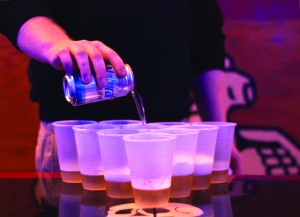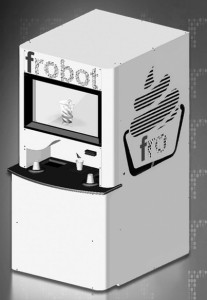BOARD MOVES ON PLAN FOR UPHILL HOUSING,
FUTURE OF DOWNTOWN HOUSING UNSURE
Dean of Students Susan Lantz and Associate Vice President for Facilities Dennis Hawley provided an update last week on the plan for a 340-student residence complex to be opened south of the Bertrand Library by fall of 2015.
The plan was approved in April of 2010 to open fall of 2013 but was put on hold in 2010 to provide further time to study student experiences under the new Dean of Students and President, according to Hawley. The Board will officially approve the development’s budget this April, planned to be approximately $45 million, according to Lantz.
The new complex will include four residential halls and one common building. Each residential hall will have four-person units with living rooms, as well as a central living room. The common building will be a multipurpose space and will include meeting rooms, room for speakers and a grab-and-go eatery. The outdoor area is planned to have open recreational spaces, a fireplace, a teaching wall and “lots of student parking,” Lantz said.
This development comes from a 1998 decision by the Board of Trustees to eliminate downtown housing to enhance student safety, said Associate Dean of Students Dan Remley. Flooding in the downtown area in recent years worsened the conditions of many of the houses and has caused many to be condemned, including 10 houses on Sixth Street. Government grants to tear down these houses expire in 2015. Landlords are agreeing to tear down on a voluntary basis, and four of these houses are scheduled for demolition as soon as this summer. The remaining condemned houses will be torn down the summer of 2014.
The decision to limit 200 students to live downtown beginning fall of 2015 is less stringent than the original 1998 Board of Trustees ban on downtown student housing starting the fall of 2013. University administration has since extended that deadline to a 200-student-cap on downtown housing by fall of 2015. Housing Services is in the process of working with Bucknell Student Government (BSG) to determine the lottery for students to apply for downtown housing. According to Remley, talks with BSG involve determining how to have fair representation of students in that lottery.
These changes in housing also come as part of the University’s recent efforts to enhance student experiences on campus by consolidating the student body onto campus.
“We want to enhance Bucknellians’ experiences, and aggregate spaces for students to engage and converse,” Remley said.
The release of the Campus Climate Report in the fall of 2011 highlighted the lack of common spaces in residential buildings for students to hang out.
“Fraternity houses are some of the only buildings on campus with these sorts of common living rooms. Residential halls like McDonnell or Hunt do have some common spaces but those spaces can be reserved by different organizations or clubs on campus, rather than living spaces that allow for more impromptu social gatherings,” Lantz said.
The University has since created focus groups to improve campus residential halls. In addition to the uphill housing plan, administration has worked to create lounges in Smith and older residential halls, installed 52-inch televisions in 38 residential halls, moved administration offices out of Vedder and replaced them with lounge spaces.
As for the uphill housing plan, administrations hopes to create a place where “peer groups can live among each other,” Remley said.
“This is a way for students to have apartment style living but still live on campus,” Lantz said.
The new uphill housing plan comes as part of the Campus Master Plan published in 2008. The first ground to be broken as part of the plan was in 2011 for Academic West, directly behind the Bertrand Library. The plan prioritizes academic spaces such as Academic West and a new arts building, and includes projects for new residential spaces and altered entrances to campus according to the University website. In addition to planning the construction of uphill housing, the administration recently demolished the Kappa Delta Rho fraternity house and has slated the Lambda Chi Alpha fraternity house for demolition. In the summer of 2012, the two new houses for these fraternities were rebuilt behind what will become Academic West to make room for Academic buildings.
Lantz addressed the new housing plan at BSG Congress’s open meeting this past Sunday. Some students raised questions about how the downtown-to-uphill shift would impact the campus drinking culture. Lantz addressed concerns about the “pregame” culture on campus, drinking and driving from downtown bars to uphill residential halls, and the tensions between students and local law enforcement officials.
“Pregaming is a major concern on this campus, and the danger of staying in a dormitory room drinking hard alcohol increases when there are less downtown party destinations. If I could get rid of hard alcohol on campus, I would,” Lantz said. “The administration is open to students’ opinions. Should we open Uptown to underage students when it’s serving alcohol? We don’t know. But we’re asking these sorts of questions.”
Students’ questions signified that changes in housing may impact many realms of campus life. President John Bravman will attend this Sunday’s BSG Congress and is expected to take questions from students.


